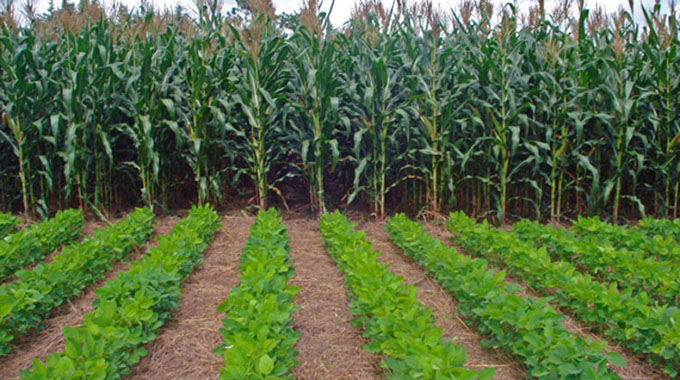Pfumvudza eases food deficit

Mukudzei Chingwere
Herald Reporter
The success of the last summer farming season has been laid bare as saturation of key consumer grains which usually run out of stock during this time of the year.
President Mnangagwa’s administration has introduced transformational measures in the agricultural sector anchored at achieving food security in the country and a return to self-sufficiency. They include among other things, the command agriculture — contract farming aimed at supporting local farmers, the Pfumvudza concept — a concept of increased production with minimum resources as well putting emphasis on climate proofing.
The second republic has also implemented irrigation rehabilitation programmes and soil and water conservation initiatives among a host of others that have increased output.
In separate interviews various stakeholders attributed the current festive season availability of key consumer grains to a successful and well planned Pfumvudza season in the previous farmer cropping season.
Grain Millers Association of Zimbabwe (GMAZ) national chairman Mr Tafadzwa Musarara said their adequate preparation to supply the market during this festive season was a result of a successful agricultural season.
“We are pleased to inform our consuming public that there are more than enough supplies of maize meal, bread, flour, self-rising flour, rice, salt, sugar beans and stock-feeds.
“Zimbabwe had a bumper harvest and there is no way we can have a shortage of our products, credit should go to the Government as they have succeeded in ensuring food sufficiency.
“The Government has done very well in ensuring the availability of food and I think we must applaud the efforts of President Mnangagwa and his Government,” said Mr Musarara.
He said President Mnangagwa has succeeded in making sure the availability of food is guaranteed in a short space of time which makes the dream of attaining an upper middle income society by 2030 a reality. The Confederation of Zimbabwe Retailers (CZR) president Mr Denford Mutashu applauded the Government, suppliers and manufacturers for ensuring the supply chain remains intact. “Manufactures and suppliers met the demand and ensured that there are no shortages and that there are no price increases during this period.
“We are working very closely with our suppliers to ensure that the glitches we have experienced in the past, for example issues to do with product procurement, are dealt with,” said Mr Mutashu. He said the planning however, was made possible by the availability of commodities locally, hailing the Government for a successful summer cropping season after supporting local farmers to increase production.
Maize-meal, flour, wheat, beans, small grains, bread, sugar, cooking oil, rice and even stock feed are among commodities whose prices have moved southwards in recent weeks, bringing relief to consumers who had become accustomed to prices changing as they queued to pay at till points.
The supply of goods has also normalised, with most supermarkets now fully stocked, leading to the elimination of a black market for some commodities.
Although prices of some products are going up owing to importers failing to access forex from the formal market, the margin of increases is not substantial.
Zimbabwe National Chamber of Commerce president Dr Tinashe Manzungu said the country was on course to return to a food basket of the continent.
He said President Mnangagwa’s administration has successfully transformed the “art of farming and agricultural methods, managed by competent, dedicated and resourceful professional farmers. “Products especially those from local farmers are readily available and prices of these locally produced products are generally fair, this should be attributed to a successful agricultural season. “Zimbabwe has done well in sustaining the local market and with the agricultural initiatives being put by the Government we are also now very competitive exporters on the global scene, such exports are important as they earn foreign currency for the economy,” said Dr Manzungu. He said sustainable economic growth should be hinged on export and hailed the agricultural sector for being on track to a competitive return to exporting of its produce across the world.








Comments